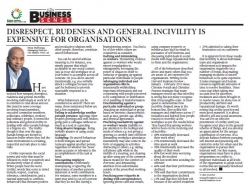
Musa Makhunga Managing Director - HR Matters (Pty) Ltd : Disrepect, Rudeness And General Incivility Is Expensive For Organizations
Have you noticed how rampant disrespect, rudeness and general incivility involving individuals at work is? It is common to read about and see this trend in news coverage involving board members, executive committee members, politicians, celebrities, workers and ordinary people. It seems like politeness and general civility in dealing with other people belongs to a bygone era. The reality though is that over the ages, human beings are known to function better where they feel the team environment is a trusting, respectful and safe place to take risks.
Civility represents the social norms and rules that must be followed in order to positively and productively relate to others. When people hear the word ‘civility’, words that come to mind include: respect, courtesy, tolerance, consideration, and a rational approach to conflicts. Behaviours that threaten positive and productive relations with other people, therefore, constitute uncivil behaviours.
You can be uncivil without meaning to, for instance, you simply assume that what’s acceptable in one social context (say, at your old workplace or at your home) is acceptable across all contexts. Or you can be uncivil intentionally, e.g. you verbally attack a colleague because you can’t be bothered to provide reasonable responses to a situation.
What behaviours can be considered as uncivil? There are many, those mentioned below are just a few examples:
-
Failing to acknowledge another person’s presence: Ignoring other people’s greetings and well-wishes; going past a colleague without so much as a nod or a greeting
-
Using abusive language: Being verbally abusive or using crude language
-
Gossiping: It’s uncivil behaviour to both instigate and spread rumours against another person, regardless of whether the ‘news’ seems accurate or relevant to the accomplishment of the task at hand.
-
Discounting employee contributions: Deliberately downplaying or ignoring the importance of another person’s statement or work contribution. For instance, some members in a team may tend to cut off a person that they do not like during a brainstorming session. You find a lot of this where others are considered as outsiders
-
Bullying and intimidating co-workers: Threatening violence against co-workers who would report irregularities to management; leveraging the power of cliques in order to ostracise or ganging up against particular individuals or people.
-
Sabotaging individual and organisation efforts: Intentionally withholding important information and not cooperating with people perceived to be competition or distribution of or paddling of misinformation
-
Discriminating against a particular individual or group: Attacking an individual or group based on intrinsic characteristics such as race, gender, age, ability, and physical appearance.
-
Practicing insensitivity against co-workers’ needs: Inability to pay attention to the feelings and needs of others e.g. not giving a grieving co-worker time off before demanding workplace attendance. Insensitivity may also come in the form of engaging in activities distracting to others, e.g. taking cell phone calls while in the middle of a meeting, not cleaning up after using any of the common spaces meant for the comfort of everyone, and demanding attention from subordinates outside of the prescribed working hours.
-
Practicing poor etiquette in dealing with correspondence: Ignoring phone calls and emails, using company property or infrastructure such as email in pursuance of self interests, and discussing individuals in social media with huge reputational risks to them and the organisation.
All of the behaviours described above and many others that you are aware of, are expensive for organisations. Writing in the Harvard Business Review : January â€" February 2013 issue, Christen Porath and Christine Pearson maintain that many managers would say that incivility is wrong but not many recognise that it has tangible costs. In their quest to demonstrate how incivility chipped away at the bottom line, they polled 800 managers and employees across 17 industries and learned how people reacted to incivility at the workplace as per the results below. They found that among workers who’ve been on the receiving end of incivility:
-
48% intentionally decreased their work effort
-
47% intentionally decreased the time spent at work
-
38% intentionally decreased the quality of their work
-
80% lost work time worrying about the incident
-
63% lost work time avoiding the offender
-
66% said that their performance declined
-
78% said that their commitment to the organisation declined
-
12% said that they left their job because of the uncivil treatment
-
25% admitted to taking their frustration out on customers
It is apparent from these results that incivility is about individual, team and organisation effectiveness as it impacts the organisation negatively on a number of fronts, thus making managing incidents of uncivil behaviours to be quite expensive. It takes managers and human resources significant amounts of time to resolve hostilities. These costs soar when taking into account fees for attorneys, mediators and others brought in to resolve issues, let alone loss of productivity, attrition and reputational damage. It’s worth noting that civility goes beyond mere good manners. It is about effective self and social awareness. You can’t be an effective practitioner of civility until you recognise your place in the general scheme of things, and you develop an appreciation for the unique contribution of everyone. It’s a delicate balance between pursuing self-interest and practicing self-control in order for others and the organisation to pursue their interests well. For this reason, organisations must have in place programmes on civility to empower individuals at all levels of the organisation to adopt social norms that are mutually beneficial to all involved.
T: 083 2516704
musa@hrmatters.co.za
www.hrmatters.co.za